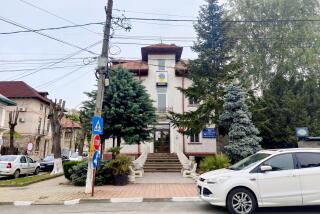Free Romania Television Fueled Nation’s Revolution : Revolt: The state station, once a propaganda tool, has become the heart and soul of Romania’s anti-Communist struggle.
- Share via
BUCHAREST, Romania — The television station that once beamed the glory of Nicolae Ceausescu to a numbed nation has become not only the voice, but the soul of the revolution that toppled his government and ended his life.
While everything it broadcast once was suspect, nothing now is believed until it appears on Free Romania Television, as the station is calling itself. Although he was reported captured and executed, it wasn’t until television showed Ceausescu in captivity that the nation sighed in relief.
The station first broke from the propaganda of the Stalinist past Friday morning, when army units joined protesters to drive Ceausescu from his palace and from power.
“We’ve won. We’ve won,” poet Murica Dinescu suddenly shouted into the camera. But those giddy opening moments only were a prelude to the battles with Ceausescu loyalists that followed.
The National Salvation Committee clung to the television like a mantle of power, running the country from a barricaded studio while Ceausescu’s fanatical guard tried to blast it into silence. Sniper fire smashed windows and heavy shells blew holes in the walls.
Early Saturday morning, news editor Victor Ionescu announced on the air:”We are under attack.” He urged people to rally outside the TV station in a massive human shield to protect the building. Almost immediately, a crowd formed.
People chanted, “Freedom! Freedom!” until gunfire broke out. Each time, they scattered and regrouped. They shouted, “We won’t go,” and they didn’t. Outgunned, the attackers pulled back.
Later that weekend, Ceausescu’s guard struck again. Infiltrators stabbed people in the hallways of the 13-story complex, reportedly killing three. For a few hours, TV screens went mysteriously blank.
But the interruption was merely a technical problem, it was explained. Romania was still governed from a hectic studio littered with empty bottles, cracked coffee mugs and half-eaten sandwiches and run by people who had not slept in days.
Television has played a large role in the forces of reform that swept the East Bloc this year. Mass demonstrations were shown live on TV in Czechoslovakia in the days preceding the Communist leadership’s downfall; East Germans able to watch West German broadcasts followed closely news of the loosening of travel restrictions and the rallies that brought down Erich Honecker; a Solidarity economic minister goes on the air with regular “fireside chats” to the people.
Free Romania Television has become a chaotic reflection of the country it covers, a jumbled but jubilant mirror of the revolution it helped orchestrate.
“It is madness here, madness,” said Gratiela Ripeanu. Her external relations job used to consist mainly of shaking hands with fraternal Bulgarians.
Suddenly, she was shepherding countless foreign TV crews all desperate to relay film back home. Reporters counted on her to find them National Salvation Committee members to interview.
One by one, she steered people and their bulky gear through an obstacle course of gun barrels, locked gates, roiling crowds and skittish guards who looked for explosives in ballpoint pen refills. Six body searches separated the street from the studio.
“We don’t know what we are doing anymore, but we’re doing it,” she said.
Elena Maria Ionescu, a news writer and Victor’s wife, helped out in the studio, partly because her office was a gaping hole in the eighth floor.
She smiled broadly when she recognized several reporters who had sat with her until morning during the first assault.
They had subsequently stayed in the relative luxury of hotel rooms, but she was still on the job.
“I’ve slept here, ate here, washed things out here,” she said. “My husband is so hoarse he can hardly talk on the air.” Nevertheless, she seemed ready for another four days.
Most of the station’s 1,300 employees were caught up in the mad metamorphosis.
Until the revolution, the station broadcast only two hours daily, a deadening litany of the heroic and generous qualities of Ceausescu. Romania’s austerity budget left it short of equipment and supplies.
Suddenly, it was on the air around the clock, and Romanians who once scorned television sat glued to their screens.
Technicians cannibalized old gear and pushed technical tolerances to the limit.
Armed soldiers wandered across the set, and overtired officials reverted to the hated communist term for comrade, tovarase, rather than domnul, or mister, but the show went on.
During the assault, section chiefs and janitors alike beamed with pride at the unflickering image they broadcast across the fearful nation. In the face of rumors and threats, the reassuring voices on television maintained the momentum of the revolt.
Unlikely heroes emerged in the heat of battle. Marin Constantin, who edited youth programs, took it upon himself to make sure the eighth-floor occupants made it through the night.
When the shooting started, he herded everyone into a central hallway protected from ricochets by a double layer of walls. When he found no other way to extinguish the grilled ceiling light, he deftly smashed it with a chair.
When the heavy fighting began, his grin broadened, comforting others whose thoughts were beginning to rattle them. To amuse the company, he sang an old national hymn that was almost forgotten during Ceausescu’s reign.
It went, “Wake up, Romania, from the mortal sleep into which you have been lulled by the evil tyrant.”
The song, broadcast earlier in the day over the battered transmitters, seemed to fit Free Romania Television.
More to Read
Sign up for Essential California
The most important California stories and recommendations in your inbox every morning.
You may occasionally receive promotional content from the Los Angeles Times.













